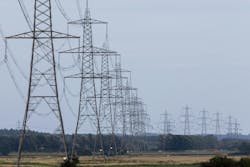Federal-State Initiative Launched to Modernize U.S. Power Grid and Enhance Resilience
The Biden-Harris Administration has launched the Federal-State Modern Grid Deployment Initiative on May 28 to improve the U.S. power grid's capacity, reliability, and resilience.
This initiative involves 21 states committing to prioritize modern grid solutions: Arizona, California, Colorado, Connecticut, Delaware, Hawaii, Illinois, Kentucky, Maine, Maryland, Massachusetts, Michigan, New Jersey, New Mexico, New York, North Carolina, Oregon, Pennsylvania, Rhode Island, Washington, and Wisconsin.
The focus is on deploying advanced conductors and grid enhancing technologies, which enhance transmission capacity and efficiency. This approach aims to integrate renewable energy sources more quickly and cost-effectively.
The initiative promotes collaboration among federal entities, states, utilities, and stakeholders to tackle issues like increased load growth, aging infrastructure, and climate change impacts. Technical and financial assistance is provided by the Department of Energy (DOE) and other federal agencies through programs such as the Grid Resilience and Innovation Partnerships (GRIP) Program and the Empowering Rural America (New ERA) program.
To expedite project development, new categorical exclusions under the National Environmental Policy Act (NEPA) simplify the environmental review process for transmission upgrades. Investments from the Inflation Reduction Act (IRA) and Bipartisan Infrastructure Law (BIL) support grid enhancements and job creation.
The Justice40 Initiative ensures that 40% of the benefits from federal climate and clean energy investments reach disadvantaged communities. Additionally, the initiative plans to upgrade 100,000 miles of existing transmission lines with advanced technologies over the next five years, aiming to reduce utility bills and increase grid resilience.
About the Author
Christina Marsh
Senior Editor
Christina Marsh is senior editor of T&D World at Endeavor Business Media (EBM), responsible for managing, editing, and contributing to the print issue production in addition to e-newsletters and digital content including podcasts. Previously, Christina was editor of Airport Business at EBM where she was responsible for contributing editorial support for the magazine, writing and compiling e-newsletters as well as contributing to digital content including producing video and podcasts. Before working with EBM, Christina was a multimedia journalist and podcast producer at The Experimental Aircraft Association (EAA). She graduated with a B.S. in journalism from the University of Wisconsin Oshkosh.

